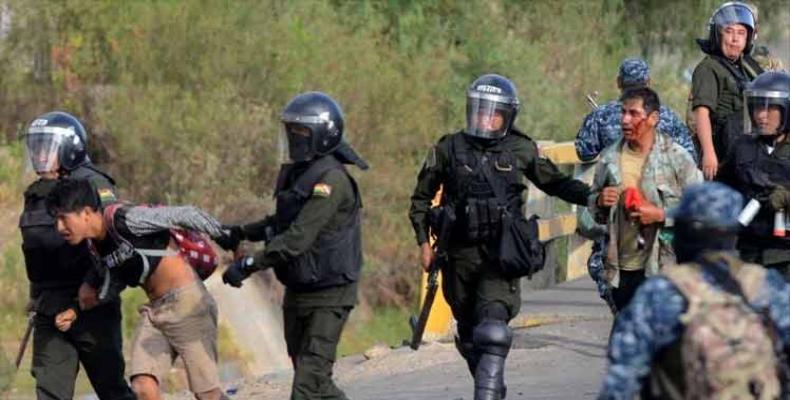La Paz, December 21 (RHC)-- Since the military coup d'état of November 10th, the de facto regime in Bolivia has been carrying out political persecution against members of the Movement Towards Socialism (MAS) party and its supporters, including its leader, the former president now a political refugee in Argentina, Evo Morales.
On Friday, an attack on the physical integrity and property of three members related to the MAS party was made public, among them the kidnapping of Marcial Escalante, vice president of the Movement Toward Socialism-Political Instrument for the Sovereignty of the Peoples (MAS-IPSP) of Yapacani, in the department of Santa Cruz.
The Eco Alternativo Network of Argentina, made up of journalists who cover what is happening in Bolivia in the context of the coup, denounced the kidnapping of Escalante, claiming that plainclothed police entered his home at dawn on Friday and also beat his wife and took some material objects. Escalante was released on Friday afternoon and further details are unknown. The MAS leader had attended a meeting with other members of the MAS party with Morales in Argentina, and it is presumed that this could be the reason for his kidnapping.
In another incident, the former personal and family assistant for Morales, Luis Hernan Soliz Morales was arrested in the city of La Paz, after the Public Prosecutor’s Office found phone calls that Soliz had received after Morales resigned from the presidency on November 10th, in the context of the mass protests following the coup.
Soliz’s lawyer said that his defendant’s house was raided and that no evidence were found that could compromise him. He also said that the reason for the calls between the two involved were related to work pending before the resignation of Morales, he told Erbol, a local media outlet.
Meanwhile, the residence of the former Minister of the Presidency, Juan Ramon Quintana was searched by members of the police and prosecutors. He is charged with alleged crimes of sedition, terrorism and terrorist financing. The former minister was not at home, and unofficially it is known that he is in the Mexican embassy in Bolivia, as were other former authorities of the Morales administration.
This political persecution has its origin in the accusation of the de-facto government of Jeanine Añez against Morales, who was accused of inciting violence from his asylum in Mexico, a country that first received him, during the demonstrations following the coup against his government.
The complaint is based on supposed evidence that includes a video in which a voice attributed to Morales is heard, but whose authenticity has only been demonstrated by a single way presented by the Añez government, and not by other independent sources.
Since then, the investigation process for the crimes of sedition and terrorism has been carried out throughout the country against militants and leaders of the MAS party.
This past week, the Prosecutor's Office issued an arrest warrant against Morales, who was the first indigenous president in the history of the Andean country and is currently a refugee in Argentina.


